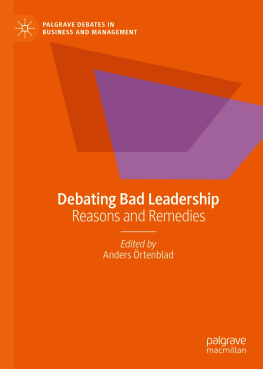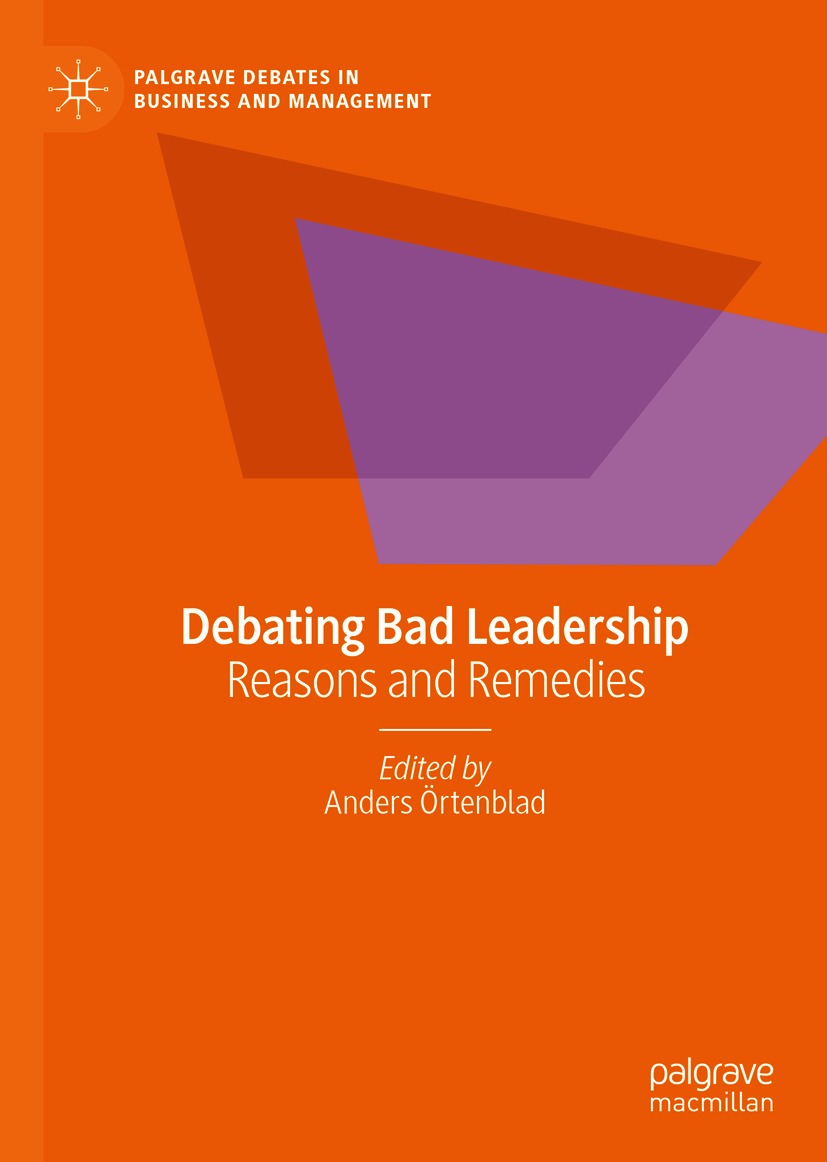Anders Örtenblad (editor) - Debating Bad Leadership: Reasons and Remedies
Here you can read online Anders Örtenblad (editor) - Debating Bad Leadership: Reasons and Remedies full text of the book (entire story) in english for free. Download pdf and epub, get meaning, cover and reviews about this ebook. year: 2021, publisher: Palgrave Macmillan, genre: Business. Description of the work, (preface) as well as reviews are available. Best literature library LitArk.com created for fans of good reading and offers a wide selection of genres:
Romance novel
Science fiction
Adventure
Detective
Science
History
Home and family
Prose
Art
Politics
Computer
Non-fiction
Religion
Business
Children
Humor
Choose a favorite category and find really read worthwhile books. Enjoy immersion in the world of imagination, feel the emotions of the characters or learn something new for yourself, make an fascinating discovery.
- Book:Debating Bad Leadership: Reasons and Remedies
- Author:
- Publisher:Palgrave Macmillan
- Genre:
- Year:2021
- Rating:3 / 5
- Favourites:Add to favourites
- Your mark:
Debating Bad Leadership: Reasons and Remedies: summary, description and annotation
We offer to read an annotation, description, summary or preface (depends on what the author of the book "Debating Bad Leadership: Reasons and Remedies" wrote himself). If you haven't found the necessary information about the book — write in the comments, we will try to find it.
This stimulating collection tackles the question that is uppermost in most of humanitys minds and hearts right now. The novel debating approach that is taken generates a rich understanding of the range of ways in which bad leadership is created, manifested and most importantly, remedied. - Professor Brad Jackson, Waikato Management School, The University of Waikato, New Zealand
In the midst of a world full of incompetent and incoherent leaders this book is exactly what we need: a veritable cornucopia of critical leadership studies. - Keith Grint, Professor Emeritus, Warwick Business School, UK
While we like to have leaders who guide, looking at the present state of the world, there are far too many leaders who misguide. It makes this anthology on bad leadership more than timely. The various contributors, taking many different perspectives, highlight the ways leaders can go astray. In these very difficult times, this book will be a must read for anybody interested in this subject. - Manfred F. R. Kets de Vries, Clinical Professor of Leadership
Debating Bad Leadership, edited by Anders rtenblad, is a book for this time! The rise of populism and the emergence of so-called strong leaders in many countries have created a social, political, and economic climate that begs for closer examination of the origins, characteristics, and forms of, especially, bad leadership. Taking as its starting-point the question of why there are so many bad leaders in the corporate world, the impressive collection of chapters compiled in Debating Bad Leadership canvasses a comprehensive array of issues ranging from toxic, psychopathic, leadership and ethical failure to issues of poor selection, ill-considered recruitment, leader (in)competence, conflicted or weak followership, to the very concept of leadership itself. In debating these fundamental issues, this book illuminates and educates, and offers some remedies, both theoretically and practically. Debating Bad Leadership challenges scholars, students and practitioners of leadership to continue this fundamental discussion, for the benefit of us all. - Gabriele Lakomski Professor Emeritus, Melbourne Centre for the Study of Higher Education, University of Melbourne, Australia.
In this book, leadership experts explore why there are so many bad leaders, and suggest remedies for how the current situation could be improved. Some of the experts suggest that reasons for why bad leaders are so common are searched for in people: more specifically leaders-to-become, acting leaders or followers. Others suggest that reasons are to be found in the leadership role (or expectations on those having such role), in the lack of support for leaders, or in beliefs about leadership. On the backdrop of their suggested explanations as to why there are so many bad leaders, the experts suggest remedies that could be taken to decrease the number of bad leaders as well as their negative impact. The very presumption that this book rests upon also gets its fair share of critique, by some of the experts.
Anders rtenblad is Professor of Working Life Science at the University of Agder, Norway. He is the editing founder of the book series Palgrave Debates in Business and Management.
Anders Örtenblad (editor): author's other books
Who wrote Debating Bad Leadership: Reasons and Remedies? Find out the surname, the name of the author of the book and a list of all author's works by series.














